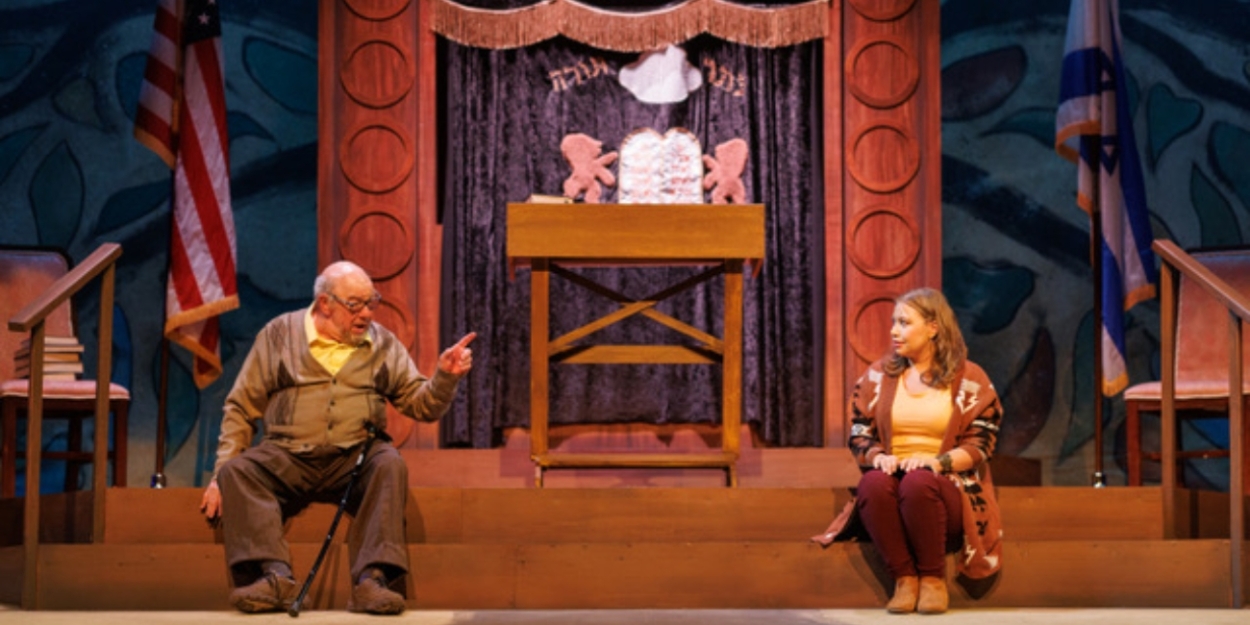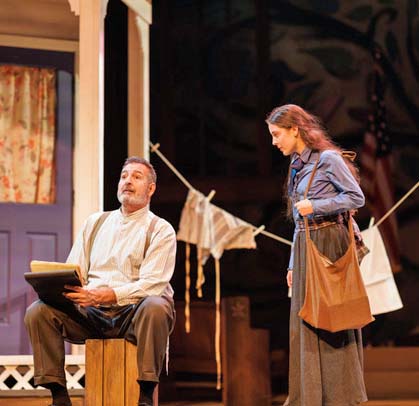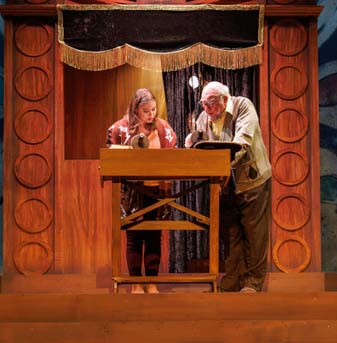
Victor Wishna’s new play “Tree of Life” deserves an audience beyond its current World Premiere production ending on September 22. It is a blessing (a bracha) to those fortunate enough to see the premiere engagement. This unusual and original new play is directed by Jonah Greene.
The story revolves around a tiny, century old, small-town synagogue in rural Iowa. It is performed, appropriately enough, on the stage of the White Theatre inside the Jewish Community Center in Overland Park.
I found myself pleasantly surprised, unexpectedly touched, and professionally impressed with this quality offering. “Tree of Life” is a first-class production. The set is simple, well crafted, and evocative of small-town synagogues during the early and mid-twentieth century.
A time warp element transports the audience to the founding of this little Jewish community in the early part of the 1900s. A farmhouse typical of that period rolls downstage right whenever explanation is needed.
“Tree of Life” takes place in fictional Wiconee, Iowa both now and at the time of the temple’s founding near the conclusion of World War I.
Widower Ken Kline (Victor Raider-Wexler) is President of the small shul. Ken receives Marianela (Patricia Carillo), a visitor from outside Medellin, Columbia by way of the University at Iowa at Iowa City.

Marianela has traveled to Wiconee to research her doctoral dissertation. She will relate the story of this tiny house of worship and her own story, slowly revealed over the course of the play.
Ken, from Chicago, has lived in Wiconee for more than three generations. His late wife, Lilly, is a descendant of the Litvak family, one of the original Jewish settlers here. He is a teddy-bear of a man, difficult to argue with, but impossible to dislike.
Wiconee has offered Ken a happy life. He is reluctant to loosen his grip on memories of his Lilly. She remains included in ongoing conversations. Ken often still sees her and imagines her hand brushing his shoulder.
Ken’s sense of self centers on the synagogue where he and Lilly worshiped together, that her family helped found, and on the Torah that rests in the arc. Family lore says this Torah was rescued from the old country.
Marianela has been introduced to Ken via email by Susie Wolf, a former congregant, a Board member, and Marianela’s doctoral advisor at the University.
Together they remove the Torah from the arc. The sacred Torah is the five books of Moses in scroll form as delivered to Moses on Mt. Sinai.

in "Tree of Life"
Ken has long ago lost his ability to read the Hebrew. He hands Marianela a pointer (a Yad) used to follow the text and is surprised to find she is fluent in Hebrew. Marianela from South America is unexpectedly Jewish.
The audience experiences a time warp to 1919. We are on the front porch of Julius (Greg Butell) and Brucha Litvak (Sarilee Kahn) and their teenage daughter, Becky (Sophia Payton). It is Friday afternoon. Julius has closed their store on Main Street in preparation for the sabbath.
The Litvaks have emigrated from the former Russian empire; somewhere in the pale of settlement. Pogroms are mentioned at Kishinev, Moldova in 1903 and 1906. Especially brutal attacks forced many eastern European Jews to emigrate. This one was ugly enough to have been noticed and condemned by U.S. President Theodore Roosevelt.
The Litvaks have resided in Wiconee for more than a decade. Originally peddlers of dry goods from a cart, they were welcomed, prospered, and now owned a store with property. Eventually, they will own a department store enterprise. Half the merchants on Main Street are Jewish. They are a community. Becky, born in Europe, is thoroughly Americanized.
Julius and Brucha are about to host the town’s weekly sabbath service. Julius dreams of building a temple in Wiconee with its own Torah.
The Torah is the heart of a synagogue. The Torah is a hand lettered scroll on kosher animal skins produced by specially trained scribes in a process unchanged since ancient times. A new Torah can cost to $50,000 in today’s money and take to a year to create.
Back to the present. A meal is being shared. Eddie (Marshall Rimann) and Linda (Margaret Shelby) have just returned from a European vacation. They cannot wait to share their adventure.
After the usual round of kibitzing, the final member of our now cast arrives. Jean (Kathy Breeden) is an elderly lady who needs a cane. Jean lives with her caretaker, grandson Mark. Jean complains Mark doesn’t do enough to help.
There is a round of wrangling between the women about where Marianela will stay while visiting in Wiconee. Jean briefly considers playing matchmaker.
Ken is unaware of the true reasons for this meeting and Marianela’s visit. An offer has been made to buy the temple. A minyan of ten can no longer be assembled in Wiconee. Many families have moved away.
It is suggested the offer be accepted and the Torah be gifted to Marianela’s fledgling community in Columbia. Ken is violently opposed.
Marianela has come to witness a decommissioning ceremony for the synagogue and offer a new home for their Torah with her community outside Medellin, Colombia.
Act I ends with another scene set in 1919. Word has come that Cousin Moshe (Jordan Fox) has escaped the Russian Revolution and will be arriving on the late train tonight.
Playwright Wishna has cleverly used Act I as mostly complicated exposition. His bright dialog reflects a sense of humor that shows how older Jews sometimes argue and discuss. He has set up the central conflict and allows for an Act II resolution.
How can Ken be convinced to give up his Torah? We have not yet met Moshe. What will we learn? What more does Marianela have to share? How does this tale resolve across at least three continents?
Victor Wishna is fortunate to have been so well supported by the White Theatre new works program, a fine director in Jonah Greene, and a remarkably well-balanced cast. Everyone is excellent.
In particular, this production is fortunate to have acquired the services of Victor Raider-Wexler as Ken. Raider-Wexler is a veteran professional with an incredible resume on stage, screen, and television. He is impossible to dislike and is a gift to those who share the stage with him.
Victor is one of those performers who makes everyone around him look better at what they do. He can make you laugh and just as deftly make you feel his anguish.
“Tree of Life” continues at the White Theatre through September 22. Tickets are available online at www.thejkc.org/white-theatre/ or by telephone at 913-327-8054.
Photos courtesy of the White Theatre
Reader Reviews

Videos

